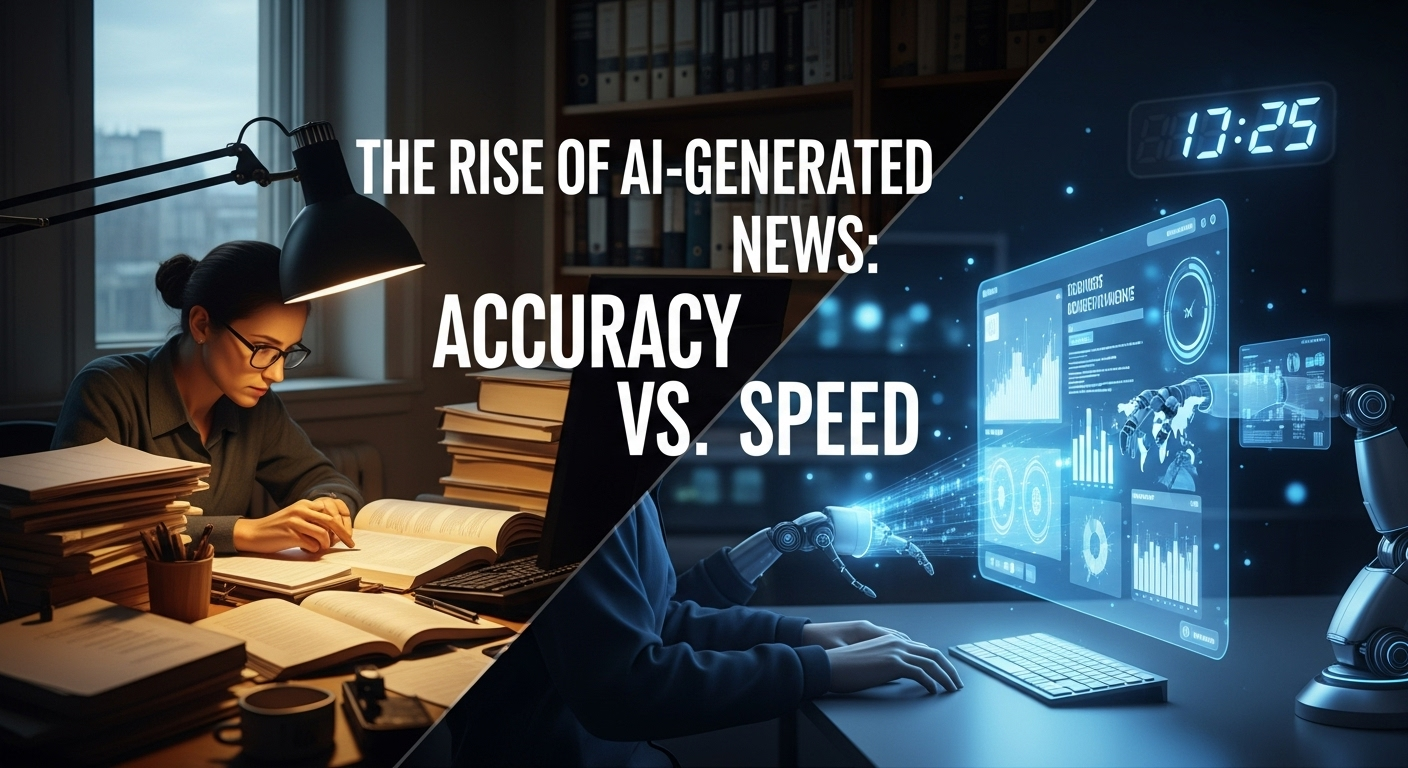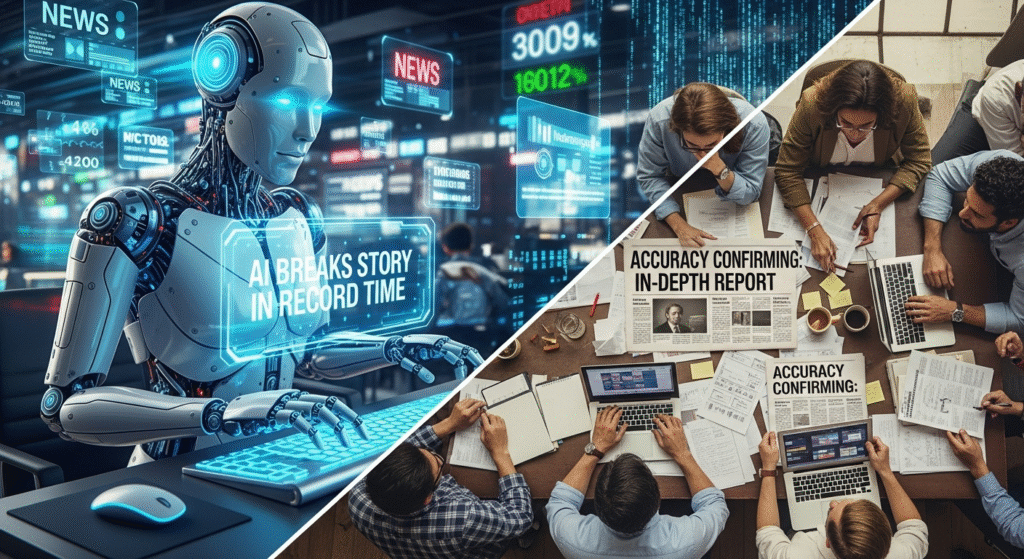Okay, let’s talk about something that’s been swirling around my head – AI-generated news. You’ve probably seen it popping up more and more, right? At first, I was like, “Cool, efficiency!” But then, the questions started nagging at me. Can a machine really understand the nuances of a complex situation? Can it capture the human element, the empathy, the sheer weirdness of reality that makes news… well, news?
I mean, think about it. News isn’t just about facts; it’s about context, perspective, and yeah, even a little bit of storytelling. Can an algorithm genuinely deliver that? I’m not so sure. Crazy Games for example uses AI to make customized games, but they can’t replace the need for human game testers.
The Allure of Speed: Why AI News is Taking Off

The answer is fairly obvious. Speed. In today’s 24/7 news cycle, being first is everything. And let’s be honest, AI can churn out articles faster than any human journalist. Earnings reports? Sporting events? Natural disasters? An algorithm can grab the data, spit out a coherent (ish) narrative, and bam! You’ve got a story before anyone else. I see why news organizations are tempted. But at what cost? And that’s what I keep coming back to.
But it’s not just about speed. It’s also about cost. Hiring journalists, editors, fact-checkers… that’s expensive! AI, in theory, can automate a lot of that, potentially saving news outlets a ton of money. Especially for smaller, local news organizations fighting to survive. News deserts are becoming a big problem; check out this article for more info.
Accuracy Under Fire: The Downside of Algorithmic Reporting
Here’s the thing: AI is only as good as the data it’s fed. And if that data is biased, incomplete, or just plain wrong, well, the AI-generated news is going to be biased, incomplete, and just plain wrong. Garbage in, garbage out, as they say. And that’s a huge problem when we’re talking about informing the public.
I initially thought the biggest risk was outright fabrication – AI making up stories out of thin air. And that definitely happens. But the more insidious risk, in my opinion, is subtle distortion. AI can amplify existing biases, cherry-pick data to support a particular narrative, or simply miss important context. And because it’s often presented as objective and unbiased, people might be more likely to trust it, even when they shouldn’t.
I keep thinking of one specific example: during my brief stint as a local reporter (about 6 months – didn’t love it, honestly), I covered a city council meeting about a proposed new development. The AI could have easily reported on the number of votes for and against the proposal. But it would have missed the angry resident who stood up and accused the developer of bribing officials, or the subtle but significant changes made to the plan at the last minute. That’s the stuff that really matters, the human drama that informs the cold, hard data.
The Human Touch: Why Real Journalists Still Matter
Okay, so I’ve painted a pretty bleak picture of AI-generated news. But it’s not all doom and gloom. I think there’s a place for AI in the newsroom. It can handle the routine stuff, the data-crunching, the basic reporting. It can free up human journalists to do what they do best: investigate, analyze, and connect with people.
Here’s where my personal experience comes in. During my time in media, I learned how many layers there are in building trust with sources. It is about sharing a coffee, getting to know a contact’s family and building a real bond. This means the human touch remains a must. But that said, how do you build this trust at scale when we have media conglomerates that own so much of our press? How do we get back to a place where trust is not just assumed but earned. That is the question.
But, and this is a big but, we need to be vigilant. We need to demand transparency about how AI is being used in news production. We need to educate ourselves about the potential biases and limitations of AI-generated content. And we need to support independent journalism, the kind that’s driven by curiosity, empathy, and a commitment to truth. Check out this article.
Because here’s the thing: news isn’t just a product; it’s a public service. It’s essential for a healthy democracy. And we can’t afford to let algorithms undermine its integrity. The rise of AI in news is a good and bad thing. How to control it and it’s use remains the most pressing question.
FAQ: Unpacking the Nuances of AI in News
How can I tell if a news article was written by AI?
That’s the million-dollar question, isn’t it? It’s getting harder and harder to tell. Watch out for articles that are overly generic, lacking in specific details or human anecdotes. Do they lack a clear author or source information? Those can be a red flag. Also, be wary of articles that present information in a very structured, almost robotic way. Human writers tend to meander a bit, include personal observations, or make unexpected connections. If it feels too perfect, it might be AI.
Why are news organizations using AI if it’s so problematic?
Primarily, it boils down to cost and speed. News organizations are under immense pressure to produce more content, faster, and with fewer resources. AI offers a tempting solution: automate some of the more routine tasks of news production and free up human journalists to focus on higher-level work. It’s also worth noting that some AI tools can be genuinely helpful, like transcribing interviews or analyzing large datasets. The key is to use AI responsibly and transparently, not as a replacement for human judgment.
What are the biggest ethical concerns surrounding AI-generated news?
Where do I even begin? Bias is a huge one, as I mentioned earlier. If the data used to train an AI is skewed, the AI-generated news will reflect those biases. Lack of accountability is another concern. Who’s responsible when an AI makes a mistake or publishes false information? Is it the news organization, the AI developer, or someone else entirely? And finally, there’s the potential for manipulation. AI could be used to generate propaganda, spread disinformation, or even impersonate journalists. It’s a scary thought.
Could the rise of AI-generated news kill off journalism?
I don’t think so, but it could definitely change it. I believe that AI is more likely to augment journalism than replace it entirely. However, it’s vital that real journalists are protected from AI to keep the essence of the practice in tact. Think about it this way: AI can handle the basic facts, but it can’t replace the critical thinking, ethical judgment, and human connection that journalists bring to the table. As long as we value those qualities, there will always be a need for human journalists. That said, the industry needs to adapt. Journalists need to embrace new technologies, learn how to work alongside AI, and focus on the unique skills and perspectives that they bring to the table. Otherwise, they risk becoming obsolete. And that would be a tragedy.



